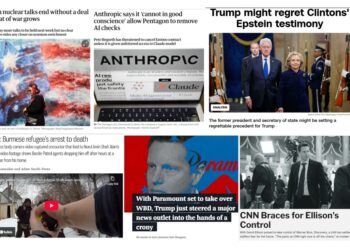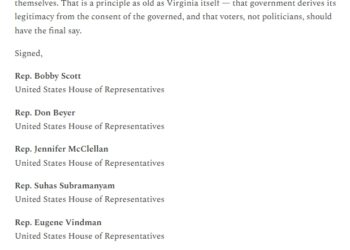(So, Ken Cuccinelli combines extreme right-wing lunacy with slimy corruption (CONSOL Energy, Jonnie Williams, Bobby Thompson, etc, etc.), a complete lack of ethics. The worst of all worlds. – promoted by lowkell)
We’ve all read about Ken Cuccinelli’s ethics problems. He’s taken a lot of money from the Star Scientific folks, bought their stock, and didn’t report it. He’s tried to dodge by saying that the problem in Virginia is a bad ethics law, not bad people. It’s the legislature’s fault, he says, not his, and there ought to be a special session to fix the law. But he’s swept under the rug that his Office is gutting part of the statute with a surprising (the kindest adjective that would fit here) interpretation. It’s an interpretation that shows his disdain for government ethics and his kinship with folks who think compliance with law is for other people.
Virginia’s Conflict of Interest Act says that senior officials like Mr. Cuccinelli are filers who have to disclose investments and gifts. Each state agency has to offer training on the Act to its filers, and each state filer has to get trained by his agency at least every two years. Pretty clear.
But, when a Freedom of Information Act (FOIA) request asked who in the Attorney General’s (AG’s) Office got trained during the Cuccinelli years, things fogged up pretty quick. A response on Attorney General Cuccinelli’s letterhead stonewalled. It said, first, that the FOIA Act didn’t apply to the AG and his Office, and secondly that, while “each state agency” had to provide training on ethics, the AG’s office was not a state agency. No documents were produced.
The assertion that the AG’s office was exempt from the FOIA attracted press interest, and was quickly withdrawn. The second assertion – that the AG’s Office is not a state agency — slid under the radar, at least up to now.
Why the stonewall on the FOIA request? It’s hard to get past the suspicion that the AG’s Office didn’t want to come clean on ethics training. It took two more FOIA requests and months of delay, but in the end the AG’s office coughed up documents showing that during the Cuccinelli’s years as AG only one person in the AG’s office has been trained on the Act’s every-two-year schedule and Cuccinelli himself has never been trained.
The subsequent FOIA requests asked that the AG produce any court decision, opinion of the attorney general or other authority that would support the assertion that the AG office is not a state agency. The AG’s response: “no such document could be found.” It nonetheless stuck to its position that for purposes of the Conflicts Act training requirement “this Office is not classified as a ‘state agency.'” It had two reasons. Neither holds up.
First, the AG’s office asserts that the AG’s office is not a state agency because the Virginia Constitution prescribes the requirements for election to the office of Attorney General. This is not persuasive. If being mentioned in the Constitution was enough for an agency to ignore the training requirement, the State Corporation Commission wouldn’t be training its filers, but it does. (Their letter is at the end of this post.) Second, it is silly for the AG’s Office to point to the statute that creates it to say it is not a “state agency,” when that law proceeds on the assumption that it is an “agency.” In particular, that Chapter of the Virginia Code says that:
• the AG’s Office may not promulgate regulations “when another state agency is authorized” to do so. Va Code § 2.2-520(B)(2);
• the AG’s Office is authorized to refer discrimination complaints “to another agency” (Va Code § 2.2-520(B)(1)); and
• filings with the AG’s Office affect “the time limit for filing with other agencies.” Va Code § 2.2-522.
The Virginia Administrative Procedure Act defines “agency” in terms that cover the AG’s Office (see Va Code § 2.2-4001 and §§2.2-520 (B)(2) and 59.1-9.10 (M)). Indeed, the Virginia Administrative Code lists the Department of Law as “Agency 45.”
If more is needed, consider that the Conflicts Act is aimed at providing standards that are “uniform throughout the Commonwealth,” that the Act creates “a single body of law applicable to all state and local government officers and employees,” that it is aimed at assuring citizens that public officers will be guided by law, that the Act is to “be liberally construed to accomplish [its] purpose,” and that with rare exceptions that don’t apply here the Conflicts Act “shall supersede all general and special acts and charter provisions which purport to deal with matters covered by this chapter . . . .” Va Code § 2.2-3100. The position the AG’s Office asserts would frustrate each of these aims.
What’s really important here is not that Mr. Cuccinelli is a bad lawyer, running an office that takes indefensible positions for short term advantage. It is that he doesn’t care about ethics. Someone who cared about citizens’ having confidence in their elected officials wouldn’t strain to cripple the law’s training requirement. And, even if he were somehow convinced that the Conflicts Act could not be read to require the AG’s Office to train its filers, someone who cared about government ethics would voluntarily require filers in his office to get training at least as good as that offered to other state filers.
Mr. Cuccinelli has done none of this. He seems to think that he has cornered the market on morality and ethics and that it would be a waste of his valuable time getting trained on what the law says on morality and ethics.
In that regard, he’s not alone.
• “L’Etat, c’est moi.” Louis XIV.
• “[W]hen the president does it, that means it is not illegal.” Richard M. Nixon.
Appendix
Provisions of the Virginia State and Local Government Conflict of Interests Act that speak to the purpose of the Act and that require training on the Act are excerpted below.
§ 2.2-3100. Policy; application; construction.
The General Assembly, recognizing that our system of representative government is dependent in part upon (i) citizen legislative members representing fully the public in the legislative process and (ii) its citizens maintaining the highest trust in their public officers and employees, finds and declares that the citizens are entitled to be assured that the judgment of public officers and employees will be guided by a law that defines and prohibits inappropriate conflicts and requires disclosure of economic interests. To that end and for the purpose of establishing a single body of law applicable to all state and local government officers and employees on the subject of conflict of interests, the General Assembly enacts this State and Local Government Conflict of Interests Act so that the standards of conduct for such officers and employees may be uniform throughout the Commonwealth.
This chapter shall supersede all general and special acts and charter provisions which purport to deal with matters covered by this chapter except that the provisions of §§ 15.2-852, 15.2-2287, 15.2-2287.1, and 15.2-2289 and ordinances adopted pursuant thereto shall remain in force and effect. The provisions of this chapter shall be supplemented but not superseded by the provisions on ethics in public contracting in Article 6 (§ 2.2-4367 et seq.) of Chapter 43 of this title and ordinances adopted pursuant to § 2.2-3104.2 regulating receipt of gifts.
This chapter shall be liberally construed to accomplish its purpose.
§ 2.2-3128. Semiannual orientation course.
Each state agency shall offer at least semiannually to each of its state filers an orientation course on this chapter, on ethics in public contracting pursuant to Article 6 (§ 2.2-4367 et seq.) of Chapter 43 of this title, if applicable to the filer, and on any other applicable regulations that govern the official conduct of state officers and employees.
§ 2.2-3129. Records of attendance.
Each state agency shall maintain records indicating the specific attendees, each attendee’s job title, and dates of their attendance for each orientation course offered pursuant to § 2.2-3128 for a period of not less than five years after each course is given. These records shall be public records subject to inspection and copying consistent with § 2.2-3704.
§ 2.2-3130. Attendance requirements.
Except as set forth in § 2.2-3131, each state filer shall attend the orientation course required in § 2.2-3128, as follows:
1. For a state filer who holds a position with the agency on January 1, 2004, not later than December 31, 2004 and, thereafter, at least once during each consecutive period of two calendar years commencing on January 1, 2006.
2. For a person who becomes a state filer with the agency after January 1, 2004, within two months after he or she becomes a state filer and at least once during each consecutive period of two calendar years commencing on the first odd-numbered year thereafter.
As to the State Corporation Commission and training, they advised by letter of September 6, 2013 that:
“Virginia Code § 2.2-3114 provides that ‘. . . members of the State Corporation Commission . . . and other persons occupying such offices or positions of trust or employment in state government . . . shall file, as a condition to assuming office or employment, a disclosure statement of their personal interests and such other information as is specified on the form . . . .’ In accordance therewith the Commission members and a number of additional Commission employees are designated by the Commission to file the required disclosure statements every January. The Commission members and these same Commission employees take the orientation course offered by the Office of Attorney General at least once during each consecutive two-calendar-year period. The Commission maintains records of each attendee’s name and the date of their participation in the course.” (Ellipses in the original.)

![[UPDATED with Official Announcement] Audio: VA Del. Dan Helmer Says He’s Running for Congress in the Newly Drawn VA07, Has “the endorsement of 40 [House of Delegates] colleagues”](https://bluevirginia.us/wp-content/uploads/2026/02/helmermontage.jpg)
















